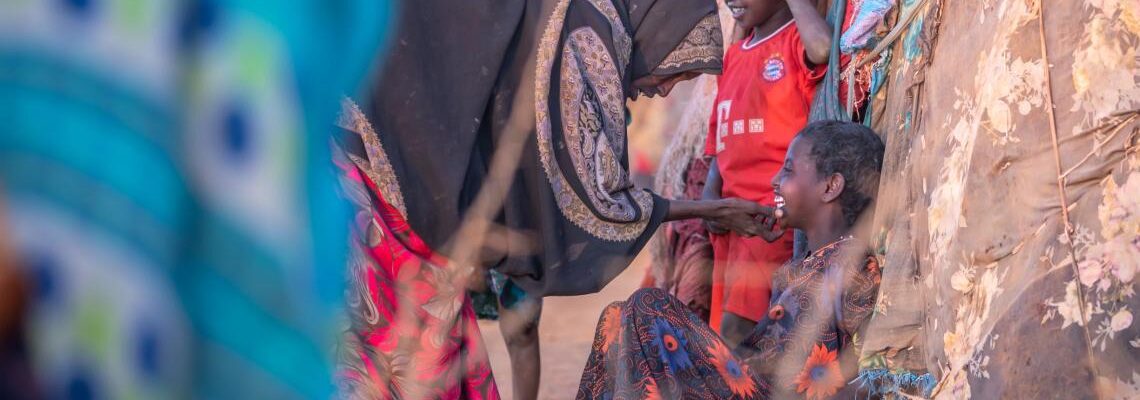CERF SAVING LIVES: Supporting children living with disabilities in emergencies
Ethiopia, Mozambique | 2023 | CERF
Ethiopia: Hargele and Mozambique: Cabo Delgado. After losing many of their cattle to the drought, Lina’s family left the village of Hulul seeking help and settled in a makeshift shelter in Bul’ad camp, in Ethiopia’s Hargele region. It is almost a year since they arrived and the family is struggling to survive.
Five consecutive seasons of failed rainfall have pushed children and families in the Horn of Africa, including the Somali region of Ethiopia, into crisis. Communities have resorted to extreme measures to survive, with thousands of families leaving their homes out of desperation in search of water, food, pasture, and treatment for sick children.
Each day, Lina’s father tries to find work in town as a day laborer. Her mother, Halima, takes care of Lina and another son, Mohammed, both of whom have developmental disabilities.
“I am not like the other parents here. I have two children with disabilities. Mohammed is six and still unable to speak. And if I left Lina by herself, she could wander around and get hurt. Besides, she has epilepsy,” Halima says.
“When kids bully her, she gets upset. That’s why I prefer to keep her at home. If she is sad, she loses her appetite and is likely to have an epileptic episode. Sometimes, she asks questions that I cannot answer. That makes me feel bad,” she explains.
Lina is among the many children with disabilities in Bul’ad camp. The needs of children affected by polio, those with hearing and visual impairments and other forms of disabilities, are often not addressed in an emergency.
To support Lina’s family and others, UNICEF includes an additional “disability top-up” in cash transfers, funded by CERF and other donors. This helps families address some of the additional needs that caring for children with disabilities entails.
“What we are providing here is cash support to help families improve their nutritional status. It is important that they have options to buy essentials depending on their needs. We also share information with mothers about better child feeding practices,” says Utpal Moitra, Chief of the UNICEF Somali Region Field Office.
So far, more than 1,700 families have received a cash grant, and priority is given to parents who have children with disabilities, like Halima. Halima used the extra cash to buy epilepsy medication for Lina.
Access to education with children with disability
The confluence of multiple crises is worsening an already severe humanitarian situation in Mozambique, where two million people needed humanitarian assistance and protection across the northern provinces of Cabo Delgado, Niassa and Nampula.
In February, more than 239,000 people were further affected by the heavy rains and Tropical Storm Freddy.
Already overwhelmed schools and healthcare facilities were struggling to provide services to everyone in need, particularly for children with disabilities, who are often overlooked in a displacement crisis.
CERF funding helped UNICEF to establish two Support Units for Children with Special Educational Needs in Pemba and Montepuez districts.
These allowed over 3,000 children to access inclusive education, and those who needed them were able to have customized wheelchairs and other assistive devices, giving them a start toward re-establishing normalcy.
Original story: adapted from original articles by UNICEF Ethiopia, and UNICEF Mozambique
More information about the CERF allocation for Ethiopia, and for Mozambique.
